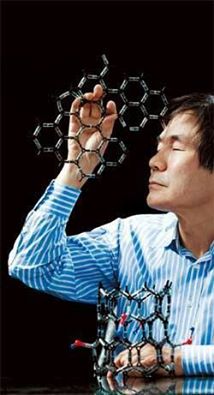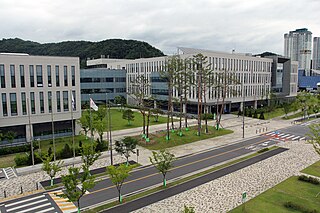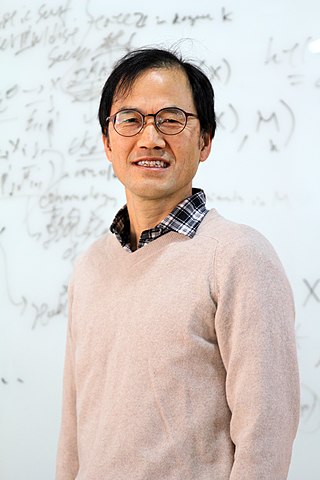APCTP | |
| Type | International Non-governmental Organization (Research Institute) |
|---|---|
| Established | 1996 |
| Founder | Chen-Ning Yang |
| President | Yunkyu Bang |
| Location | , |
| Website | www |
Asia Pacific Center for Theoretical Physics (APCTP) is an international non-governmental research institute for physical sciences. It is located on the Campus of the Pohang University of Science and Technology (POSTECH), in Pohang, South Korea, and was founded in 1996 by Nobel Laureate Chen-Ning Yang. Its previous presidents include Yang and Nobel Laureate Robert B. Laughlin.
The APCTP focuses on theoretical physics research, leading international programs in the Asia-Pacific region. It was founded in June 1996 as an international non-governmental organizations, with current member states: Australia, Canada, China, Japan, South Korea, Malaysia, the Philippines, Singapore, Taiwan, Thailand, Vietnam, Laos, Mongolia, India, Uzbekistan, Kazakhstan (16 countries). Its multi-disciplinary research environment hosts scientists working on challenging problems at the forefront of biophysics, condensed matter, quantum information, astrophysics, cosmology and particle physics. The institute also plays a key role in Korea by inviting international scholars, acting as a conduit for collaboration through focus workshops and training young scientists. In 2008, APCTP established Junior Research Groups (JRGs) under a previous president, Peter Fulde, in collaboration with the Max Planck Society in Germany, as a means to provide gifted young scientists with their first opportunity of managing research. The institute currently supports eight JRGs.
The APCTP is located at the Pohang University for Science and Technology (POSTECH), which in addition to possessing established departments in both mathematics and the natural sciences, ranks globally within the top 100 universities. Moreover, the boutique campus currently boasts the POSTECH-Max Planck center for quantum materials, as well as four centers from the Korean government flagship Institute for Basic Science program, spanning low-dimensional electronic systems, immunology, self-assembly and including the first mathematics IBS center.

The University of Göttingen, officially the Georg August University of Göttingen, is a distinguished public research university in the city of Göttingen, Lower Saxony, Germany. Founded in 1734 by George II, King of Great Britain and Elector of Hanover, it began instruction in 1737 and is recognized as the oldest university in Lower Saxony.

Yang Chen-Ning or Chen-Ning Yang, also known as C. N. Yang or by the English name Frank Yang, is a Chinese theoretical physicist who made significant contributions to statistical mechanics, integrable systems, gauge theory, and both particle physics and condensed matter physics. He and Tsung-Dao Lee received the 1957 Nobel Prize in Physics for their work on parity non-conservation of weak interaction. The two proposed that the conservation of parity, a physical law observed to hold in all other physical processes, is violated in the so-called weak nuclear reactions, those nuclear processes that result in the emission of beta or alpha particles. Yang is also well known for his collaboration with Robert Mills in developing non-abelian gauge theory, widely known as the Yang–Mills theory.
Academia Sinica, headquartered in Nangang, Taipei, is the national academy of the Republic of China (Taiwan).

The Max Planck Society for the Advancement of Science is a formally independent non-governmental and non-profit association of German research institutes. Founded in 1911 as the Kaiser Wilhelm Society, it was renamed to the Max Planck Society in 1948 in honor of its former president, theoretical physicist Max Planck. The society is funded by the federal and state governments of Germany.

The University of Rostock is a public university located in Rostock, Mecklenburg-Vorpommern, Germany. Founded in 1419, it is the third-oldest university in Germany. It is the oldest university in continental northern Europe and the Baltic Sea area, and 8th oldest in Central Europe. It was the 5th university established in the Holy Roman Empire.

Moscow Institute of Physics and Technology, is a public research university located in Moscow Oblast, Russia. It prepares specialists in theoretical and applied physics, applied mathematics and related disciplines.

Pohang University of Science and Technology (POSTECH) is a private research university in Pohang, South Korea.

The Max Planck Institute for Gravitational Physics is a Max Planck Institute whose research is aimed at investigating Einstein's theory of relativity and beyond: Mathematics, quantum gravity, astrophysical relativity, and gravitational-wave astronomy. The institute was founded in 1995 and is located in the Potsdam Science Park in Golm, Potsdam and in Hannover where it closely collaborates with the Leibniz University Hannover. Both the Potsdam and the Hannover parts of the institute are organized in three research departments and host a number of independent research groups.

The Gottfried Wilhelm Leibniz Prize, or Leibniz Prize, is awarded by the German Research Foundation to "exceptional scientists and academics for their outstanding achievements in the field of research". Since 1986, up to ten prizes have been awarded annually to individuals or research groups working at a research institution in Germany or at a German research institution abroad. It is considered the most important research award in Germany.

The Abdus Salam International Centre for Theoretical Physics (ICTP) is a research center for physical and mathematical sciences, located in Trieste, Friuli-Venezia Giulia, Italy.
The MIT Center for Theoretical Physics (CTP) is the hub of theoretical nuclear physics, particle physics, and quantum information research at MIT. It is a subdivision of MIT Laboratory for Nuclear Science and Department of Physics.
The Max Planck Institute for Solid State Research was founded in 1969 and is one of the 82 Max Planck Institutes of the Max Planck Society. It is located on a campus in Stuttgart, together with the Max Planck Institute for Intelligent Systems.

Giorgio Parisi is an Italian theoretical physicist, whose research has focused on quantum field theory, statistical mechanics and complex systems. His best known contributions are the QCD evolution equations for parton densities, obtained with Guido Altarelli, known as the Altarelli–Parisi or DGLAP equations, the exact solution of the Sherrington–Kirkpatrick model of spin glasses, the Kardar–Parisi–Zhang equation describing dynamic scaling of growing interfaces, and the study of whirling flocks of birds. He was awarded the 2021 Nobel Prize in Physics jointly with Klaus Hasselmann and Syukuro Manabe for groundbreaking contributions to theory of complex systems, in particular "for the discovery of the interplay of disorder and fluctuations in physical systems from atomic to planetary scales".

Alessandra Buonanno is an Italian-American theoretical physicist and director at the Max Planck Institute for Gravitational Physics in Potsdam. She is the head of the "Astrophysical and Cosmological Relativity" department. She holds a research professorship at the University of Maryland, College Park, and honorary professorships at the Humboldt University in Berlin, and the University of Potsdam. She is a leading member of the LIGO Scientific Collaboration, which observed gravitational waves from a binary black-hole merger in 2015.

The National Centre for Physics is a federally funded research institute and national laboratory co-located near Quaid-i-Azam University in Pakistan

Jisoon Ihm is a South Korean physicist and Distinguished Professor in Department of Physics at Pohang University of Science and Technology in Pohang, South Korea.
Peter Fulde was a German physicist working in condensed matter theory and quantum chemistry.

The Institute for Basic Science is a Korean government-funded research institute that conducts basic science research and relevant pure basic research. Comprising approximately 30 research centers with more than 60 research groups across the nation and a headquarters in Daejeon, IBS has approximately 1,800 researchers and doctoral course students. Around 30% of the researchers are from countries other than South Korea. The organization is under the Ministry of Science and ICT.
National Center for Theoretical Sciences (NCTS) in Taiwan was established on August 1, 1997 and fully funded by the National Science Council (NSC), which is reorganized and became Ministry of Science and Technology (Taiwan) (MoST) in 2014, with strong endorsement from some of the most eminent scholars, including Yang Chen-Ning and Shing-Tung Yau. It is a national research center with the goal to contribute to the advancement of frontier research, and to promote interdisciplinary and international research cooperation in theoretical sciences.

Yong-Geun Oh is a mathematician and distinguished professor at the Pohang University of Science and Technology and founding director of the IBS Center for Geometry and Physics located on that campus. His fields of study have been on symplectic topology, Floer homology, Hamiltonian mechanics, and mirror symmetry He was in the inaugural class of fellows of the American Mathematical Society and has been a member of Institute for Advanced Study, Korean Mathematical Society, and National Academy of Sciences of the Republic of Korea and is on the editorial boards of Journal of Gokova Geometry and Topology and Journal of Mathematics of Kyoto University.